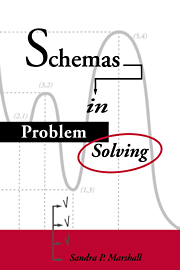Book contents
- Frontmatter
- Contents
- Preface
- Acknowledgments
- I Fundamentals
- II Schemas and instruction
- III Learning from instruction
- 6 Learning and schema theory
- 7 Learning from schema-based instruction
- 8 The acquisition of planning knowledge
- 9 The diagram: Marker and template
- IV Schemas and assessment
- V Schema models
- Notes
- References
- Name index
- Subject index
7 - Learning from schema-based instruction
Published online by Cambridge University Press: 22 October 2009
- Frontmatter
- Contents
- Preface
- Acknowledgments
- I Fundamentals
- II Schemas and instruction
- III Learning from instruction
- 6 Learning and schema theory
- 7 Learning from schema-based instruction
- 8 The acquisition of planning knowledge
- 9 The diagram: Marker and template
- IV Schemas and assessment
- V Schema models
- Notes
- References
- Name index
- Subject index
Summary
An important consideration in an investigation of schema development is the nature of the first pieces of information relevant to the schema that an individual acquires. Judging from the structure of many textbooks and the outlines of many class lessons, we should pay special attention to two kinds of information available in instruction, namely, examples and definitions. It is these types of information that are typically used in instruction, and it is from them that students will begin to develop their schema knowledge.
Consider for a moment the familiar instructional situation in which an instructor introduces a new concept to students. Remember that our interest here centers on the initial introduction of the concept, not a long-term elaboration of it. Several options are available to the instructor. For instance, she could begin with a prototypic example of the concept. The example contains specific details and is couched in a setting that is presumably well understood by the students. Students are expected to figure out for themselves the general properties of the concept from the example. An alternative approach would be for the instructor to give a general definition. This information is abstract and contains basic characteristics that should apply to all possible instances of the concept. In this case, students are left to generate their own example to illustrate the concept.
Information
- Type
- Chapter
- Information
- Schemas in Problem Solving , pp. 184 - 214Publisher: Cambridge University PressPrint publication year: 1995
